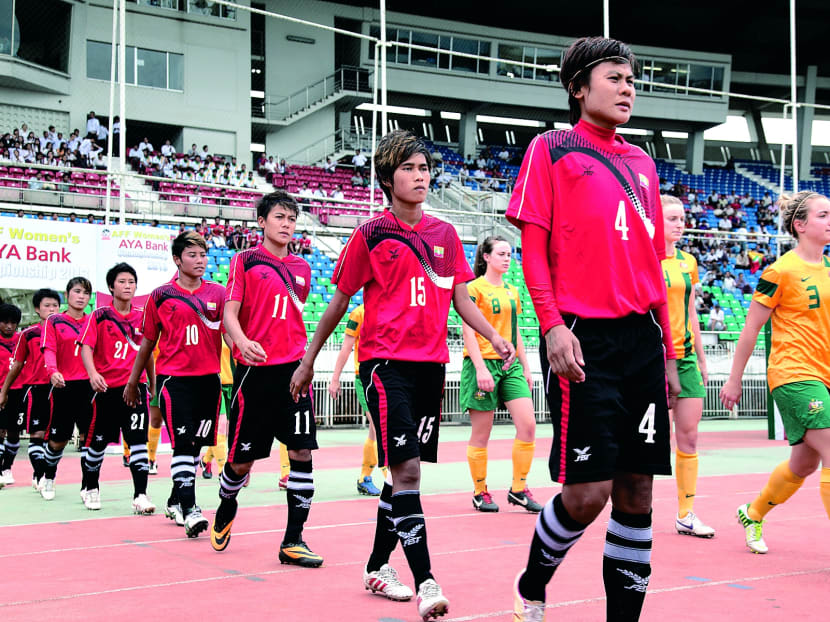A side of strength

Ms Moe Moe War (in red jersey No 4) and her sister Khin Marlar Tun (No 11) were beaten up by their brothers, when they were young, because the boys felt football was not a sport for women. Photo: Ore Huiying
Growing up in Myanmar’s Mon state, Ms Moe Moe War, 27, and her younger sister Khin Marlar Tun, 21, loved playing football. But their brothers did not like this one bit.
The boys felt football was not a sport for women, and made it clear to their sisters that it would not be tolerated. “They beat us if we played football and if our brothers knew that we were outside somewhere playing, they chased us with a stick,” Ms War said.
Though she was the eldest of seven siblings, it was her brothers who determined what happened in the house. Had she complied with what they had in mind for her future, she would now be at home cooking, keeping house and maybe helping with her parents’ business, she believes.
Instead, she kept on playing, and at age 14, while she was a student, she was scouted to be groomed for the national team. It took seven years of hard training before she was fielded to play for Myanmar in 2006. Her younger sister, too, was selected. It was only then that their family finally accepted their football careers.
In Myanmar’s patriarchal society, many women in high positions are married to powerful men or, like opposition leader Aung San Suu Kyi, benefited from having a well-known father. Those like Ms War who have no such connections and pursue tradition-defying choices must do so the hard way.
Ms War has short hair, as do most of the other young women in the national women’s football team — which, on Tuesday, won their opening match at the SEA Games, beating the Philippines 2-0 in Mandalay. The team members behave more like boys than girls — on the pitch, the girls call each other “a ko”, which means brother in the Myanmar language, instead of “a ma”, or sister.
Football is becoming more accepted as a sports for girls, they say. “It is okay now for girls to wear shorts on the field and most parents now support their daughters if they want to play football,” team manager Daw Myat Myat Oo says.
The team’s captain, Ms San San Maw, says: “Being a football player is very different from the traditional role of women in Myanmar ... While other girls stay at home and get married, I can show my skills and give something to the country.”
Ms War has not thought too much yet about her future. She does not need to get married because her football career means she gets paid well enough to provide for herself. “I do not have to depend on a man,” she says.
Her dream for now is to win the SEA Games gold medal, “because it is the first time the Games is being held in our country (in 44 years)”.
Ms War is not an outspoken feminist; she is not interested in politics; she just loves to play football and will not let anyone stop her from doing so. What she may not realise is her courage could show the world a side of Myanmar that is not about conflict and politics, a side that shows the strength of its women.





